Executive Summary
In order to understand the overarching narratives presented by the Taliban and its supporters on Twitter, Alethea investigated posts from Twitter accounts representing members of official Taliban leadership as well as social media accounts that shared pro-Taliban content from August 2021. BBC Monitoring’s Abdirahim Saeed conducted similar analysis on the Taliban’s Twitter presence.[1] Our analysis revealed three key narratives were being promoted to support the Taliban:
- Content aimed at convincing the public that the Taliban are committed to women’s rights;
- Content promoting an image of the Taliban as a legitimate civil governing body;
- Critical narratives of the US occupation of Afghanistan and American leadership
Beyond efforts from official Taliban leaders, other accounts not overtly tied to the Taliban leadership promote similar narratives through several social media manipulation techniques, including copypasta (content that has been copied and pasted across multiple sites and accounts to amplify reach) and imposter accounts that impersonated high-level Taliban officials. Both techniques amplified the narratives related to the legitimacy of the Taliban government and efforts to discredit the US occupation of the region.
The Taliban and its supporters appear to be using Twitter as the primary platform to propagate specific pro-Taliban narratives in an effort to legitimize their control at home, with a domestic Afghan audience as they seek to consolidate power, and abroad, as they seek international recognition.
Official Taliban Accounts
Alethea identified 10 Twitter accounts of key Taliban leadership and spokespeople and analyzed their activity to determine common trends. While these “official” accounts are not verified by Twitter, Alethea assesses they are used by the Taliban leadership as mouthpieces to communicate public official statements and advance propaganda. The content appears to promote (1) efforts to discredit US occupation and US leadership, (2) the Taliban’s alleged commitment to human rights, and (3) the Taliban's alleged legitimacy as a civil governing body.
Taliban Leadership Narratives
Since the US withdrawal from Afghanistan and the Taliban takeover of Kabul, the Taliban social media strategy—both from official and unofficial accounts—has been to promote pro-Taliban messaging in an effort to convince readers that the Taliban is capable of rebuilding Afghanistan. Popular tweets from official Taliban leadership-connected accounts include celebration that foreign forces have been evacuated from the country. Mohammad Naeem, Spokesman for the Taliban's Political Office, shared the following tweet:
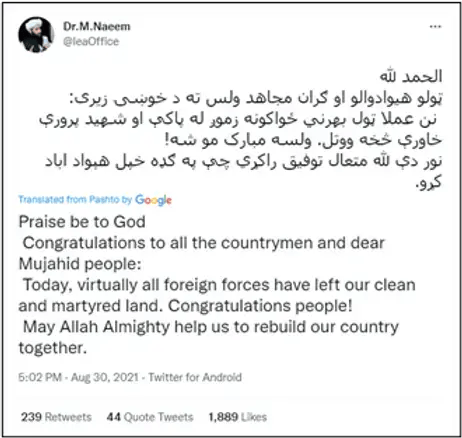
These accounts have leveraged the chaos surrounding the US’ withdrawal and their social media followings to advance narratives of victory, independence, and prosperity under Taliban rule.
Qari Saeed Khosty, a leader in the Taliban’s social media strategy, has noted that the group’s messaging efforts are concentrated on Twitter, as Facebook routinely removes Taliban groups and pages.[3] Alethea observed Taliban accounts leverage their power and influence to promote messaging about the well-being of individuals and Afghan stability and prosperity under Taliban rule. We have highlighted examples of key narratives below.
Efforts to discredit US occupation and US leadership
In the wake of the US withdrawal from Afghanistan, official Taliban accounts projected a narrative of victory and independence from US occupation. The Taliban is attempting to create an image of a prospering nation following a gruesome and terrible period of US occupation and failed US leadership. One of the highest engaged tweets across all three narratives came from the official Twitter account of the Spokesman for the Taliban, which according to Google Translate states that “The last American soldier left Kabul airport at 9pm Afghan time tonight and our country gained full independence, Alhamdulillah Walmana.”[4] The tweet has received more than 12,000 engagements, and reached an audience of around 372,000 Twitter users. The prevalence of this narrative indicates that the Taliban continues to rely on anti-American sentiment to bolster the group’s legitimacy in the minds of the Afghan public and potential international partners.
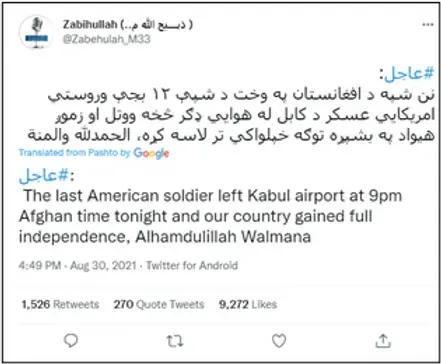
Commitment to Women’s Rights
Another recurring narrative projected by official Taliban accounts is the group’s alleged commitment to women’s rights and social equality. Suhail Shaheen, the official spokesman, who often tweets in English, has posted multiple highly-engaged-with tweets portraying the appearance of the Taliban commitment to the well-being and human rights of Afghan citizens, primarily women.[6] A tweet from the Spokesman of the Political Office for the Taliban stated, “Women come to the provincial offices of the Islamic Emirate to solve their problems.”[7] The tweet received almost 3,000 engagements and reached an audience of around 233,000 Twitter users; this level of engagement and reach is illustrative of public concentration on the Taliban’s stance on women’s rights. There appears to be a clear attempt at producing content to convince domestic and foreign audiences that the Taliban is committed to protecting the rights of women.
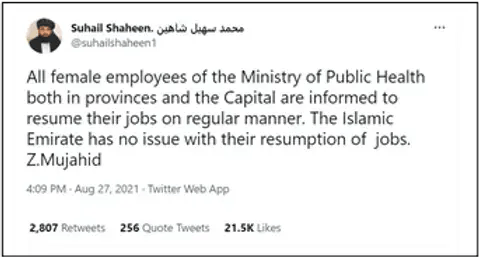
Governing Legitimacy
The narrative of commitment to women’s rights directly relates to a Taliban propaganda narrative projecting national stability and security; recent content from official Twitter accounts highlight apparent successes in maintaining order across the country. A tweet from the Chief Of Multimedia Branch for the Taliban, Ahmadullah Muttaqi, promoted a narrative of increased security, stating that NPR reported that casualties in Afghanistan have dropped to a record low and life in the cities has returned to normal. However, Alethea's subject matter and open source experts who have surfaced and attributed numerous sophisticated disinformation networks were unable to find evidence that the NPR report referenced by the Taliban Official exists. In fact, on July 26, 2021 NPR reported via the Associated Press that Afghan civilian casualties had reached a record high.[9] Similarly, posts highlighting infrastructure and construction projects, such as the video of road construction below, push an image of a stable government advancing the public interest.
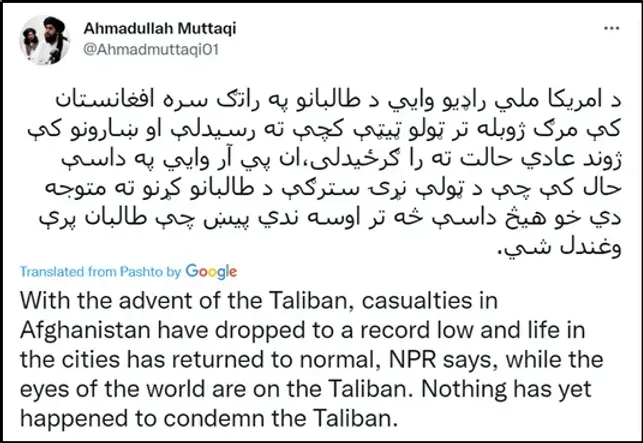

Unofficial Pro-Taliban Accounts
Alethea identified multiple pro-Taliban “influencer” accounts, several of which have tens of thousands of followers, which are not overtly tied to any individual in the Taliban leadership. Pro-Taliban influencers have existed on the platform for years; the most prominent is the popular account @SaeedKhosty, which has more than 180,000 followers and was created in 2015.[12] Another example is the account “Ambassador of Islam,” with over 26,000 followers, which has posted regular updates in Pashto about the Taliban’s takeover of Afghan provinces.[13] Influencers have served as key amplifiers of official Taliban narratives, especially narratives promoting the legitimacy of Taliban governance and the illegitimacy of the US occupation. Tariq Ghazniwal, whose Twitter bio describes him as a “Human & Women's Rights Advocate,” has defended the Taliban in media appearances discussing women’s rights, and has posted content in English assuring his followers that women will be allowed to continue working under the new regime.[14] [15] Ghazniwal’s Twitter account, which frequently posts pro-Taliban content, has over 36,200 followers.
Alethea observed multiple unofficial accounts which coordinate to spread pro-Taliban content and demonstrate signs of possible inauthentic behavior. Several of these accounts were created in 2021, mirroring the rise of the Taliban’s digital strategy and a growth in the group’s reach on Twitter in the past year. Some have been the subject of enforcement actions by Twitter, such as the account below, which was active in mid-August with an audience of over 16,000 followers but was suspended by the end of the month.
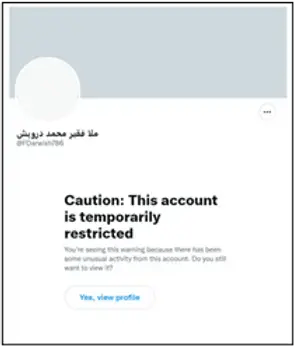
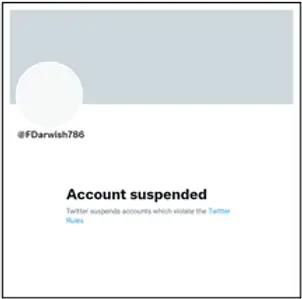
News updates, poems, and memes from influencer accounts spread across the pro-Taliban Twittersphere through a variety of amplification methods. One such method of amplification are “copypasta” tweets which are posted and re-posted by a network of connected accounts. Alethea identified multiple instances in which several accounts shared the same image and text over a period of a few hours (examples below). Copypasta amplification was particularly prominent with memes and images, especially those related to the United States’ withdrawal and the Kabul airport attack of August 26th.
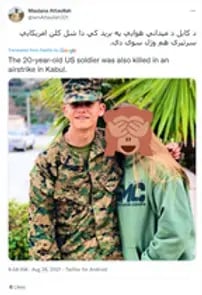
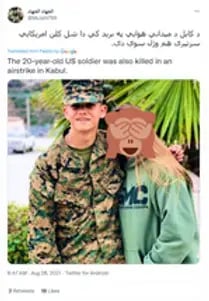
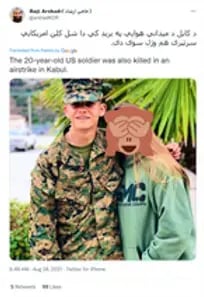
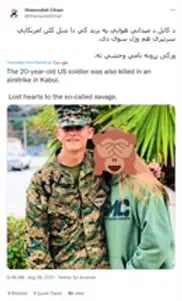
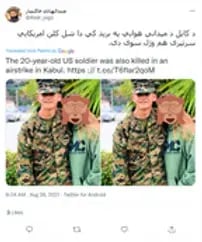
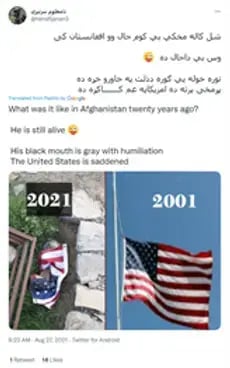
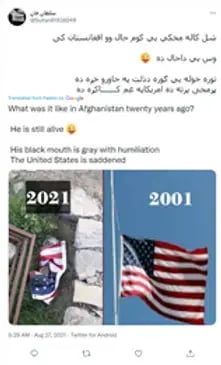
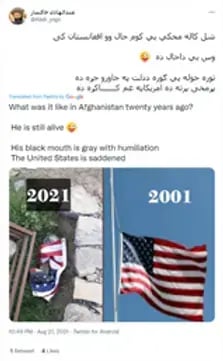
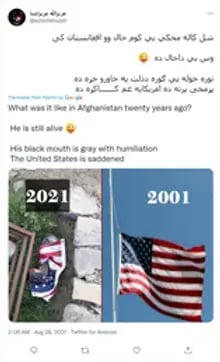
Of the eight accounts represented above, for example, six were created in 2021 and three were created within the past month. Despite the amplification of these images using copypasta, the posts received small engagement numbers.
As Taliban officials and supporters have adapted their social media approach in recent months, imposter accounts have also appeared. In the midst of online debates as to whether Taliban official Abdul Hamid Hamasi is presently living or not, Alethea identified pro-Taliban Twitter accounts calling out allegedly inauthentic accounts in his name.[26] [27] In another example of inauthentic Taliban accounts, user @AsadUll72901714, an account with 15 followers, posted a notice on August 26th that an inauthentic account was posting in the name of a senior Taliban official based Amir Khan Muttaqi. This same message was then shared by Bilal Karimi, a Taliban deputy spokesman with over 61,000 followers. The inauthentic Muttaqi Twitter account was suspended as of September 2nd.
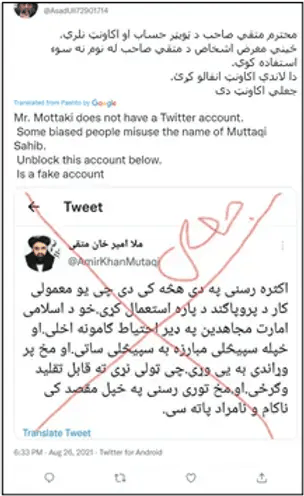
[28]
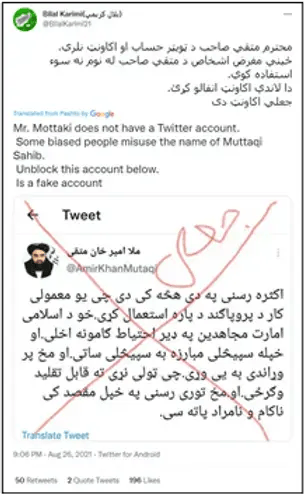
Conclusion
The online activity of Taliban leadership, as well as pro-Taliban communities, provide some insight into their strategy of engaging with the public. We assess that the narratives the Taliban shared across mainstream social media platforms is one way in which they seek to further legitimize the takeover and promote acceptance of the new Taliban government, targeting audiences inside and outside of Afghanistan.
[1] https://monitoring.bbc[.]co.uk/product/c202v9dx
[2] https://twitter[.]com/IeaOffice/status/1432448656322486279
[3] https://www.bbc[.]com/news/world-asia-58466939
[4] https://twitter[.]com/Zabehulah_M33/status/1432445362413899781
[5] https://twitter[.]com/Zabehulah_M33/status/1432445362413899781
[6] https://twitter[.]com/suhailshaheen1/status/1431348284287770630
[7] https://twitter[.]com/IeaOffice/status/1429761500659474437
[8] https://twitter[.]com/suhailshaheen1/status/1431348284287770630
[9]https://www.npr.org/2021/07/26/1020666025/united-nations-report-civilian-casualties-afghanistan-reach-record-high
[10] https://twitter[.]com/Ahmadmuttaqi01/status/1430427726750441474
[11] https://twitter[.]com/suhailshaheen1/status/1430179054406324235
[12] https://twitter[.]com/saeedkhosty?lang=en
[13] https://twitter[.]com/Akhundzada111
[14] https://twitter[.]com/IndiaToday/status/1435185616396775427
[15] https://twitter[.]com/TGhazniwal/status/1432285674263166978
[16] https://twitter[.]com/FDarwish786
[17] https://twitter[.]com/arshadKDR/status/1431569526433402882
[18] https://twitter[.]com/MuJahi799/status/1431599431086977024
[19] https://twitter[.]com/iamAttaullah321/status/1431602196802584581
[20] https://twitter[.]com/ShamsullahElha1/status/1431614704246530054
[21] https://twitter[.]com/Abdr_yxgo/status/1431603697121890304
[22] https://twitter[.]com/hanafijanan3/status/1431245972168970244
[23] https://twitter[.]com/Sultan61838249/status/1431247499151478784
[24] https://twitter[.]com/Abdr_yxgo/status/1431448833381355528
[25] https://twitter[.]com/azizullahuzair/status/1431498415553355776
[26] www.reddit[.]com/r/afghanistan/comments/p5teth/taliban_official_abdul_hamid_hamasi_who_was/
[27] https://twitter[.]com/Maliha_Tareen63/status/1433118158722932741
[28] https://twitter[.]com/AsadUll72901714/status/1431022133346512902
[29] https://twitter[.]com/BilalKarimi21/status/1431060635379453955
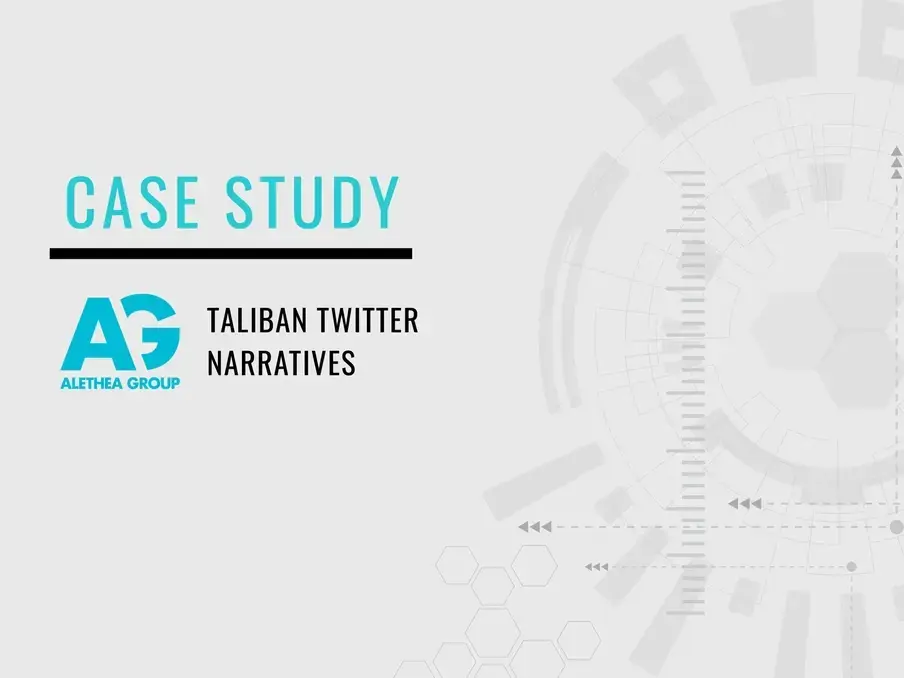



.png)
